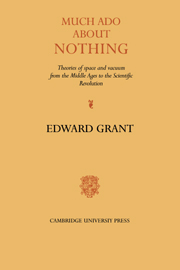 Much Ado about Nothing
Much Ado about Nothing 9 - Summary and reflections
Published online by Cambridge University Press: 07 October 2011
Summary
Aristotle's denial of the existence of a separate void space must form the point of departure of any consideration of the history of spatial concepts from the Middle Ages to the Scientific Revolution. As an entity possessed of dimensions, such a space would have been equivalent to body and therefore unable to receive material bodies. But even if void space existed, finite and successive motion in it would be impossible, as Aristotle's numerous arguments had demonstrated. Although medieval and early modern scholastics would follow Aristotle and reject the actual existence of intracosmic void, they were nevertheless prepared to consider the behavior of bodies in hypothetical extended vacua. From such conjectures and speculations, many in the Middle Ages would conclude that if extended vacua could exist, motion in them would indeed be finite and successive, a conclusion derived from the widely accepted argument known as the distantia terminorum. On the basis of the Aristotelian assumption that extended void is like a body and therefore divisible into parts, the distantia terminorum argument provided a rationale and justification for finite and successive motion by demonstrating that successive parts of that vacuum could be traversed only sequentially and therefore of necessity in a finite period, however small. Widely accepted as kinematically sound, the distantia terminorum argument also demanded a causal explanation, which proved difficult to provide.
Information
- Type
- Chapter
- Information
- Much Ado about NothingTheories of Space and Vacuum from the Middle Ages to the Scientific Revolution, pp. 259 - 264Publisher: Cambridge University PressPrint publication year: 1981